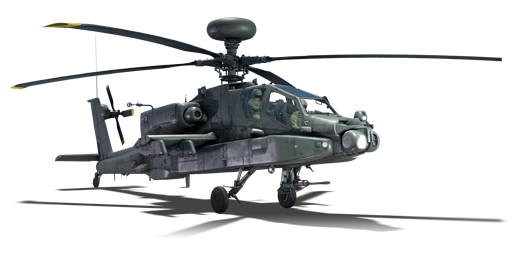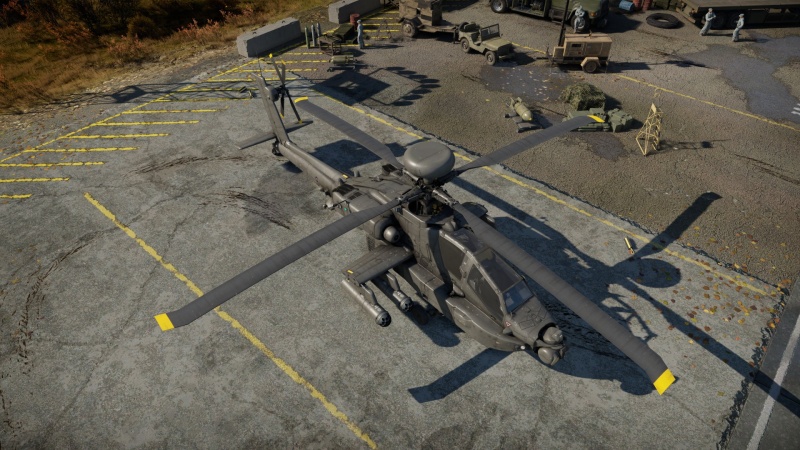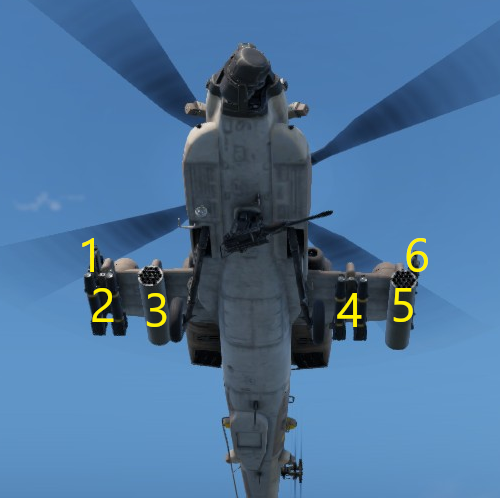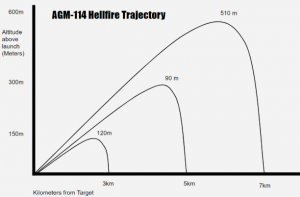AH Mk.1 Apache
| This page is about the British attack helicopter AH Mk.1 Apache. For other versions, see AH-64 (Family). |
Contents
Description
The AH Mk.1 Apache is a British license-produced version of the American AH-64D, assembled by AgustaWestland from Boeing-supplied kits and featuring more powerful Rolls-Royce Turbomeca engines. Entering service in 2005, the Apache replaced the Lynx in British tactical operations, seeing combat in operations in Afghanistan from 2007 and Libya from 2011. Unlike their American counterparts, some AH Mk.1s were partially navalised, including a folding-blade mechanism, allowing them to operate from ships in addition to land-based roles. The existing AH Mk.1s in service are planned to be retired and refitted to the AH-64E standard from 2024.
Introduced in Update 1.97 "Viking Fury", the AH Mk.1 is the pinnacle of the British helicopter tree, featuring more powerful armaments, advanced avionics, and better survivability over the preceding Lynx, while maintaining similar levels of speed and manoeuvrability. Even compared to its Apache brethren, the AH Mk.1 is distinguished by its Rolls-Royce Turbomeca engines, making it the fastest AH-64 variant in the game. Additionally, the domestic Starstreaks, while manually guided and lacking in explosive filler or proximity fuse, are certainly not a downgrade compared to the AIM-92 Stingers, as they are not decoyed by countermeasures, making them highly effective against other helicopters, and are able to run a dual purpose in the anti-tank role against lightly armoured targets with their high speed, low visibility, and reasonable armour penetration.
General info
Flight performance
The AH Mk. 1, provides great manoeuvrability, incredible acceleration and overall providing a great speed of up to 325 km/h in arcade and 300 km/h in realistic and simulator game modes. An AH Mk.1 is able to do manoeuvres other helicopters can only dream about, from barrel roles, flips to loops which allow it to evade enemy missiles with ease.
| Characteristics | Max Speed (km/h at 1,000 m) |
Max altitude (metres) | |
|---|---|---|---|
| AB | RB | ||
| Stock | 275 | 257 | 5400 |
| Upgraded | 325 | 300 | |
Survivability and armour
The AH Mk.1, has only limited armour protection installed with bullet proof glass only being installed on the pilot windscreen. The helicopter uses Kevlar boron carbide, composite martial which is limited only to instrument, floor and side panels around the cockpit. It does not provide the same level of protection as seen on other helicopters such as the Mi-28N.
- Bullet proof glass installed only for the pilot - 22 mm thick.
- Installation of Kevlar boron carbide, composite martial only on the: Seats, cockpit side panels, Gunner floor panels and pilot instrument panel - 20 mm thick.
Modifications and economy
Armaments
| Ballistic Computer | ||
|---|---|---|
| CCIP (Guns) | CCIP (Rockets) | CCIP (Bombs) |
| |
|
|
Offensive armament
The AH Mk.1 Apache is armed with:
- 1 x 30 mm M230E-1 cannon, chin turret (1,200 rpg)
- 64 x countermeasures
- 8 x large calibre countermeasures
Suspended armament
The AH Mk.1 Apache can be outfitted with the following ordnance:
| 1 | 2 | 3 | 4 | 5 | 6 | ||
|---|---|---|---|---|---|---|---|
| CRV7 M247 rockets | 19 | 19 | 19 | 19 | |||
| AGM-114K Hellfire II missiles | 2, 4 | 2, 4 | 2, 4 | 2, 4 | |||
| Starstreak missiles | 2 | 2 | |||||
| Flares | 60* | 60* | |||||
| * Both flare pods must be equipped together | |||||||
| Default weapon presets | |
|---|---|
| |
Defensive systems
The AH Mk.1 Apache has the following defensive systems installed:
- Countermeasures - Up to 192 countermeasures can be installed.
- MAW - Missile Approach Warning system.
- AMASE - Apache Modular Aircraft Survivability Equipment.
- ATASK - Air-To-Air Starstreak missiles and Infrared Counter Measures.
When unlocked, countermeasures are not installed - this requires MAW (tier I) module to be researched and installed, providing up to 72 countermeasures. The next module called AMASE (tier II) provides up to 192 countermeasures, the additional 120 countermeasures are installed on the wingtips of the helicopter. Then the last module called ATASK (tier IV) allows for the installation of a maximum of four Starstreak missiles, with two mounted on each wing tip, 30 countermeasures & an IRCM module.
Usage in battles
Overview:
The AH Mk.1 is functionally identical to the American AH-64D Apache, besides its use of the Starstreak missile system which replaces the AIM-92 Stinger. These anti-air missiles are unflarable and have a minor anti-tank capability. Because of that, spawning the helicopter with them increases its cost (putting it just above the starting points in RB). The Apache is an excellent helicopter for attacking ground targets, and can also hold its own against many enemy aircraft. The AH Mk.1 in particular has superior air-to-air and air-to-ground capability due to the Starstreak. Through adequate use of cover, teamwork, and game sense, the Apache can easily dismantle enemy teams. An Apache pilot must understand all of the tools at their disposal.
The Apache has an arsenal of weapons. The most effective anti-tank weapon in the Apache's arsenal is the AGM-114 Hellfire, which uses a top attack trajectory to destroy ground vehicles. There is functionally very little difference between the AGM-114B and K variants, used on early and late Apaches respectively.
Staying Alive:
Flying the Apache effectively can be more difficult than most players would imagine, processing information from optical sights, radar displays, and the radar warning receiver all at once can lead to information overload. If distracted by irrelevant information, a pilot can quickly lose situational awareness. Being successful in the Apache requires situational awareness above all else. Due to the fragility of the helicopter, any blindspot can lead to a quick and sudden death. Additionally, the mobility of the Apache is adequate but not impressive, so evasive manoeuvres are not always effective.
Using cover is a very important part of staying alive in the Apache. Always stay behind a hill or building in ground battles. When exposing yourself in order to fire on the enemy, be mindful to not gain too much altitude. Most importantly, Always listen to your RWR and MAW. If you hear an alarm, take evasive action immediately.
The biggest improvement of the later Apache variants is the ability to mount the Longbow radar system. This system, if used properly, will help maintain situational awareness.
Additionally, it is important to know when to use flares. Flares are extremely effective against heat-seeking missiles, but useless against any other missiles. It is the responsibility of the Apache pilot to recognize the threat and decide whether to use flares or not. For Apaches with MAW (missile alert warning), there is an option for flares to be dispensed automatically.
Using the Longbow Radar:
The radar of the Apache should be used as a secondary tool when engaging ground targets. When using the air-to-ground mode with the radar, all you have to do is select the target you want to lock on and then lock the target, this will lock your target with the FLIR camera allowing you to designate your laser. With this, you can ripple fire Hellfires and change your targets quickly without even having to spot them visually. The radar is also useful in detecting enemy aircraft. By using the multi-function menu to switch radar mode, the radar will begin to search for air rather than ground targets. Keeping track of enemy aircraft is vital to survival in the Apache, as any plane can make quick work of the Apache if the helicopter is unprepared.
Air-to-Air (Starstreak and Gun):
The Apache is surprisingly potent in air-to-air combat. Engagements should be conducted primarily through the use of the Starstreak missile. The Starstreak is an incredibly fast missile (the fastest in the game by far) and has a range of around 7 km. The Starstreak's greatest weakness is the lack of a proximity fuse, requiring a direct hit to kill. To guide the Starstreak, simply acquire lock on the target and guide it similarly to a SACLOS ATGM. It can be difficult to hit planes, but it will easily dispatch helicopters.
If the enemy gets close, the 30 mm autocannon can be extremely effective. The gun will automatically aim with optical lock, so Apache pilots can aim accurately while taking evasive manoeuvres.
Close Range Air-to-Ground (Gun and Rockets):
At close range, the Apache has excellent offensive capability. The 30 mm autocannon is incredibly accurate even at surprisingly far distances. This cannon uses a High Explosive Dual Purpose round that can engage lightly armoured targets. Rocket pods can also be used, with the CCIP computer helping maintain accuracy even at further distances. Be careful when trying to use the Hellfire missile at close range. It can do a direct attack at closer ranges (rather than its usual top attack) but if fired at an odd angle, it may not have time to manoeuvre onto the target if fired at closer ranges.
The problem with trying to engage at close range is that doing so will put the Apache in huge amounts of danger. Enemy tanks will be able to quickly destroy the Apache with their main guns or anti-aircraft machine guns.
Long Range Air-to-Ground (Hellfire and Starstreak):
At longer ranges, the Hellfire missile can be used to full effect. The Hellfire will guide on its target as shown in the attached diagram. This is known as top attack. Being that it takes this path to the enemy target, the Hellfire can take upward of 30 seconds to reach its target at longer ranges. Do not fire at enemies that are about to move to cover, and make sure to fire multiple missiles at once in order to deal maximum damage. Because the Hellfire is laser guided, multiple missiles can be fired at once. They should be fired at intervals of 5-10 seconds, where between missiles the Apache can switch to a new ground target. This will allow for the quick destruction of multiple enemies. This tactic can be incredibly effective. Although the time to target for the most recently fired Hellfire is available on the HUD, pilots will have to keep track of all the missiles they have fired by memory and quick calculations.
On the AH Mk.1, the Starstreak missile can also be used in the air-to-ground role. It is most effective when used against enemy anti-aircraft vehicles. The enemy anti-aircraft vehicles will generally be lightly armoured, so the Starstreak should be able to penetrate their armour. Most impressively, the Starstreak missile is faster than any other Surface-to-Air missile in the game, so it is very effective at surprising enemy anti-aircraft vehicles. The use of the radar warning receiver is important for finding enemy anti-air vehicles.
Pros and cons
Pros:
- Every guided weapon, including AAM, is controlled by locking the weapon, which can be done both by pilot (who also controls radar) or gunner, so the only way to stop missiles from hitting is to completely destroy the Apache itself
- Starstreak AAM can be used to quickly destroy light tanks and SPAA, if needed
- Decent anti-helicopter ability with the Starstreak, which does not care about flares, and can compete with Ka-50 and Ka-52
- Adequate speed and manoeuvrability
- Advanced countermeasure system with Radar Warning Receiver and Missile Alert Warning, although MAW can easily drain all the flares
- Good overall durability with two pilots
- Longbow radar can locate tanks and sort-of warn about approaching enemy aircraft at a slow rate if needed
- Can carry up to 16 Hellfire missiles in full late-game ATGM loadout
- Better engines than the American AH-64D Apache - slight increase in speed
Cons:
- Cannot be simply flown at 100% collective, especially when pilot needs to quickly turn around, can be very needy
- Every weapon on this Apache, including AAM, is controlled by locking the weapon, so you can't multitask and can only fight one target at a time, can be easily overwhelmed
- Cannon can only be controlled by the gunner, who is prone to being shot when helicopter is under heavy fire
- If gunner is knocked out and the scope was off-set off the last target, the helicopter will continue to off-set weapons away from targets in the same manner and it will be impossible to fix, which can hinder performance due to the AAM also being laser guided
- Easily destroyed by enemy aircraft if they are not detected beforehand
- Unreliably performing Starstreak missiles - cannot easily take down approaching jets or helicopters if they are closer than 4 km away and/or do not approach Apache directly
- Although the cannon is extremely lethal, the autopilot accuracy beyond 1 km range is rather bad and gets even worse when helicopter is moving around
- Radar can only scan ground or air at the same time and anti-air radar is extremely slow
- The particular Hellfire missiles used on this helicopter have a long time to target and often waste time on upholding the launch protocol (going up to then fall down) even when target is at close range, unless the Apache is literally falling down onto the target
- Starstreak AAM increases the spawn cost, meaning the helicopter will lose anti-air capability if you want to start with this helicopter in RB
History
In the early 1990's, the British government identified a requirement for a new attack helicopter. In 1993, invitations for bidding were issued, with responses including the Eurocopter Tiger, Bell AH-1 SuperCobra, AH-64 Apache, RAH-66 Comanche and A129 Mangusta. The Apache was selected, with a contract for 67 signed in 1996.
In 1998, Westland produced the first prototype WAH-64 Apache under licence from Boeing. The first delivery into service was made on 16th January 2001 with the final delivery in July 2004.
When the requirement for the Apache had been formalised, the assumed threat was a large conventional assault from the Eastern Bloc. Following the collapse of the Soviet Union, the Apache was refocused on concepts of flexibility and rapid response, including amphibious attack missions.
The Apache suffered delays entering service due to complications with the modifications made for British service. Issues such as lack of secure communication and damage from firing Hellfire missiles were identified but corrected prior to the Apache entering service.
In 2005 the Apache was forecast to be out of service by 2030. However, in 2016 a contract was awarded for 50 AH-1s to be upgraded to AH-64E standard, with the remaining AH-1s to be retired in 2023-24.
Media
- Skins
See also
- Related development
External links
Paste links to sources and external resources, such as:
- topic on the official game forum;
- other literature.
| Westland Aircraft Limited | |
|---|---|
| Aircraft | |
| Fighters | Whirlwind Mk I · Whirlwind P.9 |
| Turboprop | Wyvern S4 |
| Helicopters* | |
| Attack | AH Mk.1 Apache** |
| Utility | Wessex HU Mk.5 · Scout AH.Mk.1 · Wasp HAS.Mk.1 · Lynx AH.Mk.1 · G-LYNX |
| *After World War II, Westland Aircraft focused on building helicopters and changed its name to Westland Helicopters. | |
| **Licensed AH-64D | |
| See Also | Boeing Aircraft |
| Britain helicopters | |
|---|---|
| Attack | AH Mk.1 Apache · Rooivalk Mk1F CSH · Superhind |
| Utility | Wessex HU Mk.5 · Scout AH.Mk.1 · Wasp HAS.Mk.1 · Lynx AH.Mk.1 · G-LYNX |







